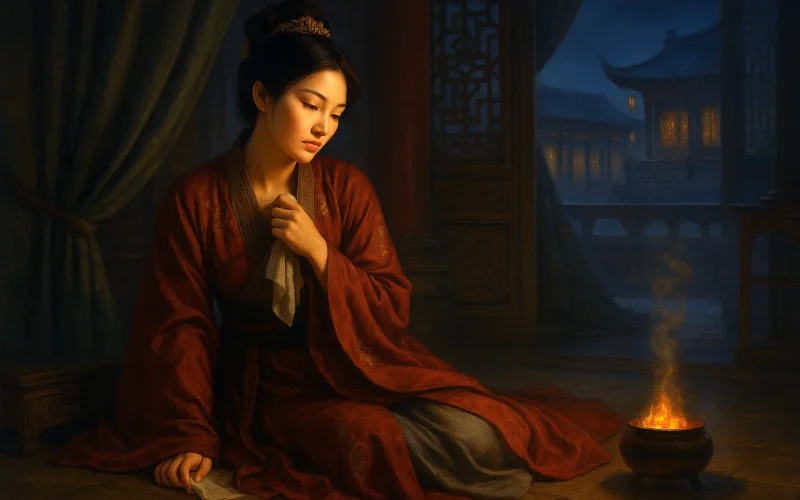Her tears are spent, but no dreams come.
She can hear the others singing through the night.
She has lost his love. Alone with her beauty,
She leans till dawn on her incense-pillow.
Original Poem
「宫词」
白居易
泪湿罗巾梦不成,夜深前殿按歌声。
红颜未老恩先断,斜倚熏笼坐到明。
Interpretation
This poem belongs to Bai Juyi's "New Yuefu" series, employing the direct, socially conscious style of Han and Wei dynasty folk ballads to address contemporary realities. It is not a generic lament on palace loneliness but a microcosm of mid-Tang court life. With scalpel-like precision, the poet dissects a cross-section of the palace at night. Through a close-up on an individual's fate, it reveals the universal tragedy of women's existence under a system of imperial favor. While it lacks specific historical reference, its high degree of typicality makes it an archetype for the fate of all palace women sacrificed to the whims of power and fickle affection.
First Couplet: 泪湿罗巾梦不成,夜深前殿按歌声。
Lèi shī luójīn mèng bù chéng, yè shēn qián diàn àn gē shēng.
Her silken handkerchief is drenched with tears, her dreams undone; / Deep in the night, from the front hall, come strains of rhythmic song.
The opening plunges directly into the core scene and mood. "Her silken handkerchief is drenched with tears" is the result; "her dreams undone" is the state—each causing the other, sketching a figure weeping through the night, unable to find sleep. "Deep in the night" marks the hour, implying this suffering has lingered long. The "strains of rhythmic song from the front hall" slice like a sharp blade through the night's silence and the woman's heart. "Rhythmic song" (按歌) indicates music following a clear, joyous beat. The more distinct, orderly, and cheerful the music, the more it accentuates the desolation, disorder, and sorrow "here" in the rear chambers. The contrast between rear and front, silence and noise, weeping and song creates a cruel juxtaposition between the pleasure at the center of power and the grief in the forgotten corners.
Second Couplet: 红颜未老恩先断,斜倚熏笼坐到明。
Hóngyán wèi lǎo ēn xiān duàn, xié yǐ xūn lóng zuò dào míng.
Her rosy beauty not yet faded, the royal favor's already run; / She leans close by the perfumed brazier, waiting alone for dawn.
This couplet is the soul of the poem, shifting from external description to an exposé of the tragedy's root cause and a final, frozen image of action. The seven words, "Her rosy beauty not yet faded, the royal favor's already run," articulate the cruel, fundamental logic of the palace woman's plight: her worth is tied solely to "imperial favor," and the severing of that favor has no relation to her personal state (whether aged or at fault) but depends entirely on the capricious will of the power-holder. The contradiction between "not yet faded" and "already run" highlights systemic injustice and the individual's absolute passivity. The concluding line, "She leans close by the perfumed brazier, waiting alone for dawn," presents an immensely expressive, statue-like pose: "leans close" suggests physical lassitude and a search for support; the "perfumed brazier" is the last remaining source of faint warmth (or perhaps a faint remnant of past favor?); "waiting… for dawn" is the formalized endpoint of hopeless waiting—a movement from the struggle of "dreams undone" to abandoning sleep, consciously enduring the full passage of time. This act of sitting exhausts all hope and bores through the endless night, solidifying intangible agony into visible, prolonged torment.
Holistic Appreciation
The poem's artistic power stems from the multiple contrasts and the protracted duration it constructs. Its structure presents a clear causal chain: the first line shows the manifestation of pain (tears, sleeplessness); the second line reveals its external cause (songs from the front hall); the third line exposes its essence (favor lost through no fault of her own); the final line depicts its ultimate form (hopeless vigil till dawn). The four lines unfold like a four-act play, advancing layer by layer from dynamic weeping ("drenched with tears") to static despair ("waiting… for dawn"), culminating in an implosion of emotional energy. With severely restrained, plain description, the poet compresses surging sorrow into the calm narration of "rhythmic song," "favor's already run," and "waiting… for dawn." Without visible agitation, the force pierces the page, showcasing the realistic spirit and profound compassion of the New Yuefu poetry: "its facts investigated and true, so that those who gather them may transmit what is credible."
Artistic Merits
- Dramatic Tension of Temporal-Spatial Contrast: "Deep in the night" versus "waiting… for dawn" constructs prolonged torment within an extended timeframe. The spatial divide between the "front hall" and the rear chambers (where the woman is) symbolizes the abyss between those in and out of favor, between revelry and solitude. This spatiotemporal setup intensifies the tragic sense.
- Symbolism and Suggestion of Detail: The "perfumed brazier" is an exquisite object choice. It is a source of warmth, hinting at autumn chill or heart-cold; it is also associated with scenting clothes, possibly evoking memories of grooming for past imperial encounters. Leaning close to it seems like clinging to the last remnants of warmth and memory.
- Objective Narration and Concentrated Emotion: The entire poem employs a third-person, objective descriptive voice, without a single word of direct lyricism or commentary. Yet, through plot points and judgments like "dreams undone," "favor's already run," and "waiting… for dawn," the poet's compassion for the character and critique of the system are deeply embedded between the lines, achieving an art that is "direct yet subtle."
- Highly Condensed Language and Universality: The line "Her rosy beauty not yet faded, the royal favor's already run" has become, due to its high degree of generalization, a classic expression revealing the passive fate of women in power dynamics. It transcends the specific palace context, attaining universal significance.
Insights
The value of this work extends far beyond sympathy for ancient palace women. It compels us to consider the inherent fragility and cruelty of any relationship built upon unequal power and capricious favor. The fate of the palace woman is an extreme representation of all individuals who base their entire worth on the whims of another, especially a superior in power.
It teaches us that true dignity and security cannot be founded on shifting, unpredictable "favor." Whether in the ancient palace or in certain interpersonal or professional dynamics in modern society, the tragedy of "rosy beauty not yet faded, favor's already run" can replay in different forms. This poem warns that maintaining personal integrity and developing inner value independent of others may be the fundamental way to withstand the long, cold nights of a fate spent "waiting… for dawn." With his poetic brush, Bai Juyi gave voice to all those deprived of speech. His profound humanistic care and critical spirit still shine with a sharp light today.
Poem translator
Kiang Kanghu
About the Poet

Bai Juyi (白居易), 772 - 846 AD, was originally from Taiyuan, then moved to Weinan in Shaanxi. Bai Juyi was the most prolific poet of the Tang Dynasty, with poems in the categories of satirical oracles, idleness, sentimentality, and miscellaneous rhythms, and the most influential poet after Li Bai Du Fu.












